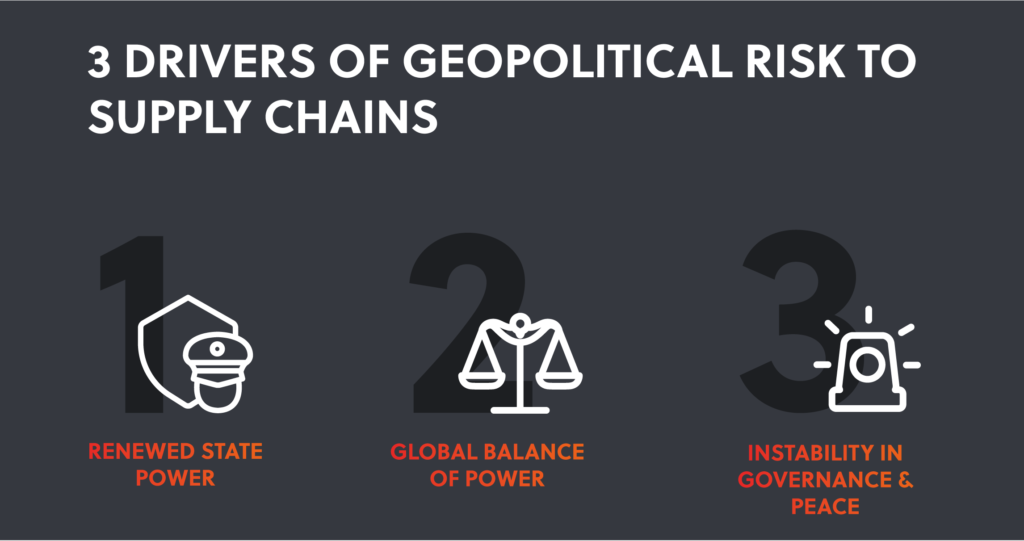In a globally interconnected world, geopolitical risks in business have emerged as significant factors affecting companies across various sectors. With intensifying challenges, including regional conflicts, trade tensions, and cyber threats, managing and mitigating these risks is crucial for businesses aiming for sustainable growth. Companies today must adopt proactive, well-informed strategies to navigate the complex intersections of politics and commerce. This article delves into the ways geopolitical tensions influence business operations, particularly in areas such as economic impacts, supply chain resilience, and regulatory compliance, and explores practical strategies for business leaders to address these challenges.
1. Key Drivers of Geopolitical Tensions Affecting Businesses
Geopolitical tensions arise from multiple sources, including regional conflicts, shifts in power dynamics, and trade disputes. These tensions can lead to significant disruptions, particularly for businesses heavily reliant on cross-border trade. A prime example is the ongoing tension between the U.S. and China, which has resulted in increased tariffs on imported goods, significantly impacting sectors such as technology, manufacturing, and retail. Understanding the intricate relationship between global trade and geopolitics allows companies to anticipate potential risks, strategically adjust their operations, and better manage international expansions.

2. Economic Impacts of Geopolitical Tensions
Economic fluctuations due to geopolitical instability can have various consequences for businesses:
- Supply Chain Disruptions and Inflation: Tensions, such as trade wars and sanctions, can disrupt supply chains and contribute to inflation, increasing the costs of goods and services and reducing profit margins. For example, the conflict between Russia and Ukraine has heightened the prices of essential resources like oil and wheat, impacting companies’ global supply chain stability.
- Currency Volatility and Exchange Rate Fluctuations: Political uncertainties can lead to currency instability, making it challenging for businesses operating in multiple countries. Companies often face increased risks when currency values fluctuate, necessitating strategies like currency hedging to mitigate these effects. Managing business risk geopolitical tension in this context is crucial, especially for companies relying on predictable cash flows.
3. Trade Policy Changes and Export/Import Regulations
Geopolitical tensions can lead to trade policy shifts that may alter the landscape of import and export regulations. Changes like heightened tariffs, quotas, or complete bans on certain imports can strain companies’ ability to source or sell products. For instance, stricter export controls on advanced technology products in the U.S. have made it difficult for certain tech firms to access international markets. Staying informed about political risks in international trade can help businesses anticipate shifts and pivot strategies to stay compliant and profitable.

4. Supply Chain Resilience Amid Political Uncertainty
Global companies face significant challenges in maintaining supply chain resilience in a politically volatile environment. Firms can reduce dependency on single suppliers or regions by adopting diversification strategies. Businesses in the automotive industry, for example, have been quick to respond by diversifying supply sources beyond Asia amid geopolitical uncertainties. Enhancing geopolitics and global supply chain resilience helps businesses maintain smoother operations, reduce delays, and avoid costly disruptions.

5. Workforce and Talent Management in Unstable Regions
When operating in politically volatile regions, businesses face unique challenges regarding workforce management. It may become necessary for companies to relocate employees, provide additional support, or switch to remote work arrangements in unstable regions. Some businesses have implemented flexible, hybrid models to retain talent while protecting employees. Addressing geopolitical risks in business at the HR level not only strengthens employee morale but also aids in business continuity by ensuring workforce stability even in times of crisis.

6. Technological Risks and Cybersecurity Threats
Geopolitical tensions increase the risk of state-sponsored cyber threats, with politically motivated hackers targeting businesses to disrupt operations or steal sensitive information. Industries like finance, energy, and technology have become frequent targets, and the need for robust cybersecurity measures has never been greater. Businesses must prioritize cybersecurity investments, employ advanced threat detection tools, and regularly train employees on cybersecurity best practices to reduce exposure to these threats. Cyber resilience is a key factor in ensuring operational continuity in a volatile geopolitical landscape.

7. Market Access and Customer Relations
Geopolitical tensions can affect market access and customer relations by influencing consumer perceptions and brand loyalty. Companies operating in politically sensitive markets need to adapt their communication strategies to align with local values and the broader political landscape. For example, brands entering Middle Eastern or East Asian markets should consider cultural sensitivities and adjust messaging to align with regional sentiments. Successfully navigating global trade and geopolitics helps businesses foster positive relationships and maintain a favorable brand image across diverse markets.

8. Energy Security and Resource Dependency
Industries that heavily rely on resources sourced from politically unstable regions face additional challenges in ensuring energy security. Energy-dependent businesses, such as manufacturers, often encounter operational disruptions when fuel prices spike due to geopolitical events. Diversifying energy sources can be an effective strategy to mitigate business risk and geopolitical tension while reducing dependency on politically volatile regions. Moreover, investing in renewable energy can provide added resilience, supporting sustainability goals and safeguarding against resource shortages.
9. Risk Management and Business Continuity Planning
In the face of geopolitical uncertainty, business continuity planning is essential. Companies that proactively assess potential risks and develop adaptable strategies for regulatory changes and regional conflicts are better equipped to navigate crises. Incorporating political risk assessments into continuity planning can help firms respond to geopolitical events promptly, thus enhancing organizational resilience.
10. Investment Strategies and Financial Risk Assessment
Geopolitical risks affect investment decisions, with many businesses becoming increasingly selective in choosing markets based on political stability. Diversifying investment portfolios and focusing on stable regions help businesses mitigate exposure to politically unstable areas. Implementing effective financial risk assessment allows businesses to anticipate risks and make informed decisions regarding international investments.
11. Compliance with Sanctions and Regulatory Shifts
During heightened geopolitical tensions, compliance with sanctions and export controls becomes critical. Businesses operating in multiple jurisdictions must ensure adherence to the evolving rules to avoid penalties and interruptions. For instance, adhering to EU sanctions against specific regions or goods may require swift adjustments to sourcing and logistics. Developing a strong compliance framework aligned with the impact of sanctions on business enables companies to avoid disruptions and maintain smooth operations across regions.
12. Future Outlook: Adapting to Geopolitical Shifts in Global Business
As geopolitical risks become a persistent part of the global landscape, businesses must adopt future-proof strategies to stay resilient. Monitoring political developments, leveraging risk management tools, and adapting operations to shifting political contexts will be essential for future growth. Proactive measures ensure that businesses remain agile and can respond to new risks while continuing to capitalize on global opportunities.
Conclusion
The impact of geopolitical risks on businesses is undeniable, as companies face various challenges, from disrupted supply chains to intensified cyber threats. Navigating these tensions requires a multifaceted approach, focusing on adaptability and strategic resilience. By diversifying supply chains, strengthening cybersecurity, and staying compliant with global regulations, businesses can mitigate risks and build long-term resilience. As political landscapes continue to evolve, firms that proactively manage geopolitical risks in business will be well-positioned to protect their operations and achieve sustained growth.






One thought on “The Impact of Geopolitical Tensions on Global Businesses”
Comments are closed.